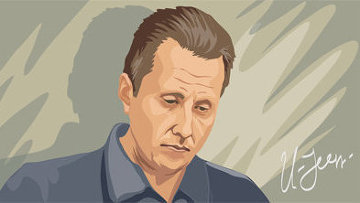MOSCOW, March 20 - RAPSI. The European Court of Human Rights (ECHR) has rejected a request filed by the Russian government to refer to the Grand Chamber a case it had previously lost in the court against former YUKOS Oil security chief Alexei Pichugin, according to an ECHR release issued Tuesday.
He was sentenced in 2005 to 20 years in prison after a Russian court convicted him of having planned the 1998 assassination of Nefteyugansk Mayor Vladimir Petukhov, as well as of the attempted assassination of former YUKOS CEO Mikhail Khodorkovsky's adviser Olga Kostina that same year. He received a life sentence in a separate case in 2007 which was stacked on top of his 2005 sentence, though the latter was not an issue in the present ECHR case.
Pichugin had alleged to the ECHR that his right to liberty and security had been violated as he was arrested without reasonable suspicion, that his detention was delayed unreasonably, and that his appeals against this were not dealt with in a timely fashion.
He further charged that in violation of his right to a fair trial, he was not granted a public hearing, was not afforded the right to effectively challenge witness statements, and was not granted a fair jury trial in accordance with domestic law.
Last October, the court found that his rights to liberty and security and his right to a fair trial had been violated, and ordered Russia to pay €9,500.
Then in January, Russia requested that the case be referred to the Grand Chamber for reconsideration.
The ECHR included the case in a list of rejected Grand Chamber requests released Tuesday.
The Grand Chamber is analogous to an appellate body. According to the ECHR’s website, “After a Chamber judgment has been delivered, the parties may request referral of the case to the Grand Chamber and such requests are accepted on an exceptional basis. A panel of judges of the Grand Chamber decides whether or not the case should be referred to the Grand Chamber for fresh consideration.”
Once an ECHR case is rejected by the Grand Chamber, it becomes final.
In February, Pichugin’s attorney Ksenia Kostromina told RAPSI that she planned to file an appeal with the Russian Supreme Court to overturn Pichugin's sentence and the cassation ruling in the 2005 case against him.
The YUKOS case has been one of the most high profile in Russia in recent years. In the early 2000s, the authorities accused Mikhail Khodorkovsky and his partner Platon Lebedev of economic crimes. The arrests and trials of a number of other company members soon followed. YUKOS, then the country's largest oil company, was declared bankrupt and its assets were taken over by Rosneft. Many in the West believe that the case was politically driven, although Moscow denies the charges.



